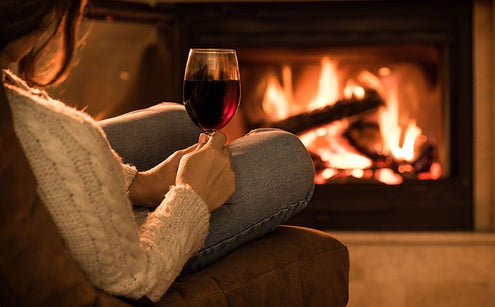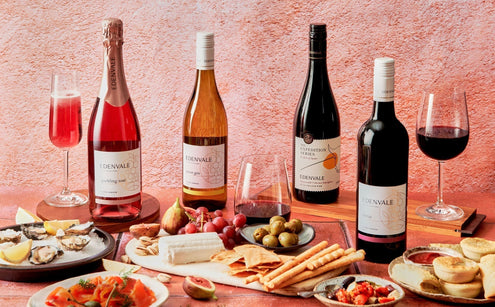Whether it’s for health, lifestyle, religious, or cultural reasons, an increasing number of Australians are pressing pause on Pinot, saying 'stop' to Sauvignon and resisting Rosé. But they’re not going without. On the contrary, many are replacing their favourite tipple with an alcohol-free alternative. But why are they making the switch? Here we explore some of the top health, social and lifestyle benefits of enjoying non-alcoholic wine.
Discover Edenvale alcohol-removed wines today.
Shop All Non-Alcoholic Wine
6 Health Benefits of Alcohol-Free Beverages
What happens to your body when you stop drinking alcohol? Here are six top health outcomes you can expect to experience or benefit from.

1. Improves Skin Health
Many studies have linked the relationship between alcohol and skin problems or diseases, including:
- Acne
- Rosacea
- Psoriasis
- Atopic dermatitis
- Melanoma and non-melanoma skin cancer

2. Gives Your Liver a Break
Excess alcohol consumption can negatively affect the liver’s ability to break down toxins and effectively regulate cholesterol, which can lead to cardiovascular disease.
Another significant health factor is the high caloric count of alcoholic drinks. Calories are absorbed in the liver, well before the nutrients from the food we consume are processed. Depending on an individual’s baseline, this caloric addition can detract from nutrients delivered from food, leading to poorer health and weight gain.
Edenvale’s alcohol-removed Pinot Gris contains 58 kilojoules, 3.8g carbohydrates and 2.8g sugar per 100ml. Yellowglen contains 276 kilojoules per 100ml. Less alcohol results in fewer calories, with the removal of 13% alcohol translating to a more than 60% reduction in calories.

3. Encourages Better Sleep
While it has often been thought that alcohol promotes sleep, lulling you into a peaceful rest, research signals otherwise. Alcohol can negatively impact the central nervous system and reduce the amount of REM sleep one experiences, which impairs the overall quality of sleep. Additionally, research has found a correlation between drinking alcohol and developing sleep disorders.

4. Helps Mental Health
Since alcohol is a depressant, slowing down the central nervous system and decreasing arousal and stimulation in the brain, it has a negative impact on physiological and mental health. Abstaining from alcohol helps to generate focus, problem-solving, critical thinking and memory. Overall, this can positively benefit mental health and is a significant reason why many begin consuming alcohol-removed alternatives.

5. Is Safe During Pregnancy and Breastfeeding
The consumption of alcohol during pregnancy, or over-consumption of alcohol during breastfeeding, can have a negative impact on a baby's growth and impair the development of their cognitive channels.

6. Increases Feelings of Social Inclusion
Drinking culture is very prevalent in Australian society, and can isolate people who don’t want to partake for cultural, religious, personal or health reasons. Sophisticated non-alcoholic alternatives offer a way to feel included socially, but not fall victim to the pressures of alcohol consumption.
Read more about the health benefits of alcohol-removed wine.
More Australians Are Choosing to Drink Alcohol-Free Beverages
Are you thinking about going alcohol-free, or at least reducing your alcohol consumption? You’re not alone; the sober-curious movement is on the rise!
Research from La Trobe University found that over 120,000 Australians claimed to have reduced how often they consume alcohol. At the same time, 6% said they had kicked the habit for good. Those aged 24 - 29 have reduced their alcohol intake because of work, studies, family and health benefits.
Why Choose Edenvale Non-Alcoholic Drinks?
Drinking alcohol-free wine doesn’t just come with health benefits. We certainly believe Edenvale non-alcoholic wine makes abstaining a pleasure. Why? Because our winemakers work hard to craft premium quality wines that are faithful to their varietals. This means if you’re partial to Pinot or tempted by Tempranillo, you can expect our non-alcoholic wines to deliver similar flavour profiles that you know and love.
Learn more about our alcohol removal process.
FAQs
Why Do People Drink Non-Alcoholic Drinks?
Australians choose not to drink alcoholic beverages for many reasons, including health, religious, lifestyle and cultural influences.
What Is the Point of Alcohol-Free Drinks?
Alcohol-free drinks are a great way to feel included in social gatherings, meals, and recreational activities that typically involve drinking. In Australia, where there are often societal expectations to enjoy a beverage during such events, alcohol-removed drinks let you participate without missing out. Since alcoholic beverages are linked to numerous health and social problems, choosing alcohol-free alternatives is also an excellent path to better self-care. Moreover, the growth of the category has contributed to significant quality improvements, so people don’t feel like they’re even making a compromise.
Why Should We Avoid Alcoholic Beverages?
Avoiding or at least limiting alcohol intake can offer myriad health and well-being advantages. These include improved sleep, skin, energy levels, liver health, heart health, mental clarity and more.
Disclaimer: This article is for informational purposes only and is not intended as medical advice. Always consult with a qualified healthcare professional before making dietary changes or if you have health concerns. Individual results may vary, and non-alcoholic wine may not be suitable for everyone, including pregnant women or those with alcohol sensitivities.




